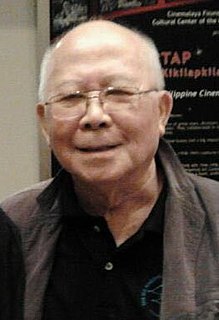A Quote by Bienvenido Lumbera
The writer has the advantage of a medium that can be contemplated many times over on the pages of a book or a magazine. The words lie on the page and the writer has an extended opportunity to imprint on his reader every meaning and nuance distilled from experience.
Related Quotes
It is easier for the reader to judge, by a thousand times, than for the writer to invent. The writer must summon his Idea out of nowhere, and his characters out of nothing, and catch words as they fly, and nail them to the page. The reader has something to go by and somewhere to start from, given to him freely and with great generosity by the writer. And still the reader feels free to find fault.
One of the most useful parts of my education as a writer was the practice of reading a writer straight through - every book the writer published, in chronological order, to see how the writer changed over time, and to see how the writer's idea of his or her project changed over time, and to see all the writer tried and accomplished or failed to accomplish.
Every reader, as he reads, is actually the reader of himself. The writer's work is only a kind of optical instrument he provides the reader so he can discern what he might never have seen in himself without this book. The reader's recognition in himself of what the book says is the proof of the book's truth.
That underscored this idea that when we're reading a book or writing a book, you're in an act of co-creation. The reader and the writer are both trying to dress up and present their best selves and then there's that moment, when suddenly, as a reader, you're not exactly you anymore, and likewise, as a writer, you're not really you.
Books are just dead words on paper and it is the readers who bring the stories alive. Previously, writers wrote a book and sent it out into the world. A couple of months after publication letters from readers might arrive. And, leaving aside the professional reviews, it is really the reader's opinions that the writer needs. They vote for a book - and a writer - with their hard earned cash every time they go into a bookstore (or online - that's my age showing!) and buy a book.
With a 660-page book, you don't read every sentence aloud. I am terrified for the poor guy doing the audio book. But I do because I think we hear them aloud even if it's not an audio book. The other goofy thing I do is I examine the shape of the words but not the words themselves. Then I ask myself, "Does it look like what it is?" If it's a sequence where I want to grab the reader and not let the reader go then it needs to look dense. But at times I want the reader to focus on a certain word or a certain image and pause there.
Books are frozen voices, in the same way that musical scores are frozen music. The score is a way of transmitting the music to someone who can play it, releasing it into the air where it can once more be heard. And the black alphabet marks on the page represent words that were once spoken, if only in the writer's head. They lie there inert until a reader comes along and transforms the letters into living sounds. The reader is the musician of the book: each reader may read the same text, just as each violinist plays the same piece, but each interpretation is different.
On a more technical level, a story takes a lot of words. And to generate words and phrases and images and so on, that will compel the reader to continue reading - that stand a chance of really grabbing a reader - the writer has to work out of a place of, let's say, familiarity and affection. The matrix of the story has to be made out of stuff the writer really knows about and likes. The writer can't be stretching and (purely) inventing all the time. Well, I can't, anyway.



































